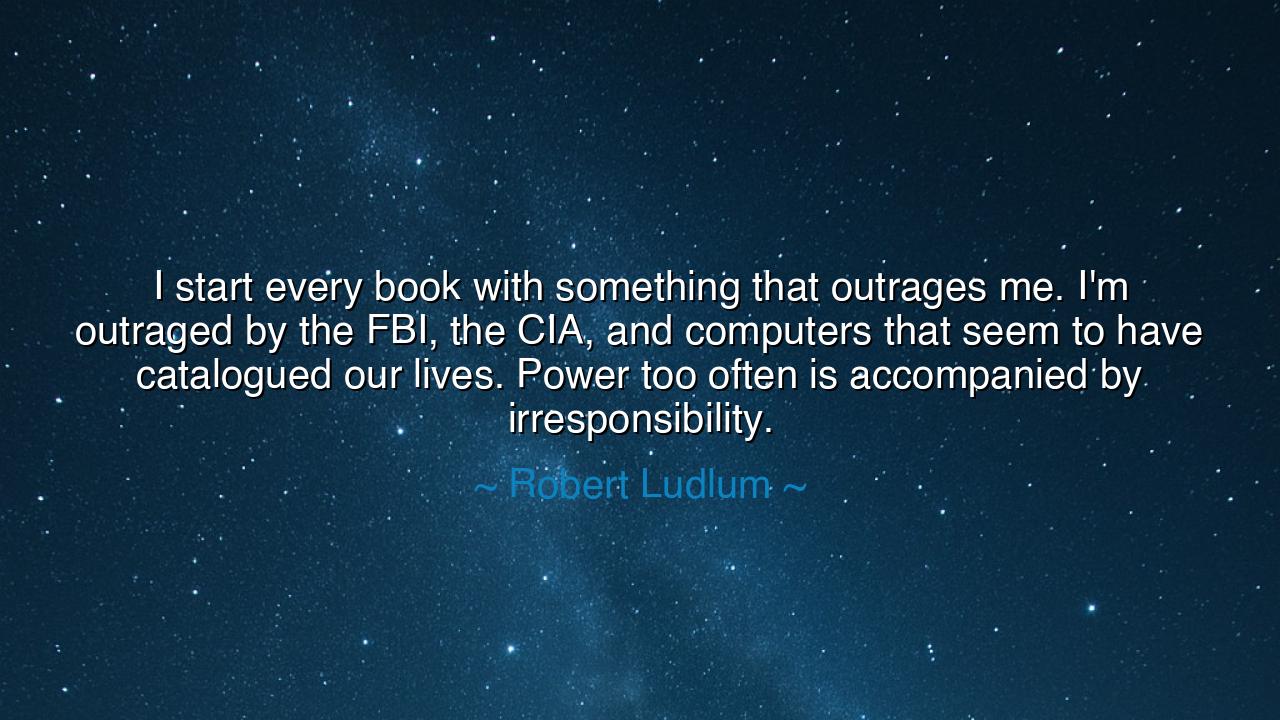
I start every book with something that outrages me. I'm outraged
I start every book with something that outrages me. I'm outraged by the FBI, the CIA, and computers that seem to have catalogued our lives. Power too often is accompanied by irresponsibility.






In the fierce and prophetic words of Robert Ludlum, the master of espionage and intrigue, we find a cry not only of a storyteller, but of a sentinel guarding the conscience of his age: “I start every book with something that outrages me. I'm outraged by the FBI, the CIA, and computers that seem to have catalogued our lives. Power too often is accompanied by irresponsibility.” In this declaration, Ludlum unveils the fire that fuels his art — a fire born of moral fury, of disbelief at how easily authority turns to abuse, and how swiftly knowledge becomes control. He speaks as one who has looked into the engines of power and found there not wisdom, but arrogance — not stewardship, but surveillance.
Ludlum was a man of his time, yet his outrage feels eternal. He lived in an age when governments reached farther than ever into the lives of their citizens, when secrets could shape nations, and when machines — the computers he speaks of — began to awaken into the silent watchers of the modern world. His novels, filled with spies, conspiracies, and hidden agendas, were not mere fictions; they were warnings wrapped in suspense, allegories of the human struggle against unseen power. In his words, the FBI, the CIA, and the creeping rise of data surveillance are not simply institutions — they are symbols of how power without restraint corrodes the trust between the governed and those who govern.
The origin of his outrage lay in observation — the artist’s gaze sharpened by empathy. Ludlum came of age in the shadow of the Cold War, when paranoia and secrecy ruled. Nations built arsenals not only of missiles but of information, believing that to know was to control, and to control was to rule. The ordinary person — the worker, the dreamer, the family — became a fragment of data, a statistic on a screen, a life measured and recorded. Ludlum’s fury was not only political; it was human. He saw the rise of a world in which privacy became a relic, and in which the state, cloaked in righteousness, could trespass upon the soul in the name of security.
This tension between power and irresponsibility has echoed throughout history. In ancient Rome, the senators who swore to defend the republic gradually surrendered its freedoms to emperors who promised safety. The mighty Caesar, claiming divine authority, crossed the Rubicon — not just a river, but a boundary of trust. The people, weary of fear, traded liberty for protection, and in doing so, forged their own chains. Ludlum’s outrage is of the same kind: the cry of one who sees history repeating itself through new tools — not swords and armies, but surveillance and technology. He warns that the corruption of power is timeless, only its instruments change.
There is another fire in Ludlum’s words — the fire of creation. He begins each book not with calm inspiration, but with outrage. To him, writing was not an act of escape, but of resistance. His characters — hunted spies, betrayed patriots, forgotten heroes — embody the eternal struggle of the individual against systems too vast to comprehend. Their battles are not only against enemies, but against the machinery of deception itself. Ludlum transforms his anger into art, his fear into story, his defiance into a warning — that humanity must remain vigilant, lest the tools we create to protect us become the very things that enslave us.
Consider the story of Edward Snowden, who, decades after Ludlum’s words, revealed how the machinery of surveillance had indeed become reality — how the state, in the name of security, had peered into the private lives of millions. Like a character from one of Ludlum’s novels, Snowden acted out of conscience, and in doing so, became both hero and exile. His story is a living echo of Ludlum’s outrage — a testament that the danger he foresaw was no fiction. It is the same story, told in a different age: the eternal battle between truth and control, between transparency and the shadows of unchecked power.
The lesson, then, is clear: outrage, when born from conscience, is not destruction — it is awakening. Ludlum teaches us that to see injustice and remain silent is to surrender one’s soul. Whether in art, in speech, or in action, each of us must channel our anger into purpose, our fear into vigilance. Do not let technology numb your empathy, nor authority command your conscience. Question what watches you, and remember that no system — however noble its name — is beyond corruption when stripped of accountability.
So, children of the modern age, heed the wisdom of Robert Ludlum: let your outrage be your beginning, not your end. In a world of vast machines and hidden powers, guard your humanity as your most sacred treasure. For though the tools of control may grow stronger, so too can the courage of the human spirit. And when you stand against irresponsibility cloaked as authority, remember this truth — that freedom survives not through obedience, but through the courage to be outraged for what is right.






AAdministratorAdministrator
Welcome, honored guests. Please leave a comment, we will respond soon